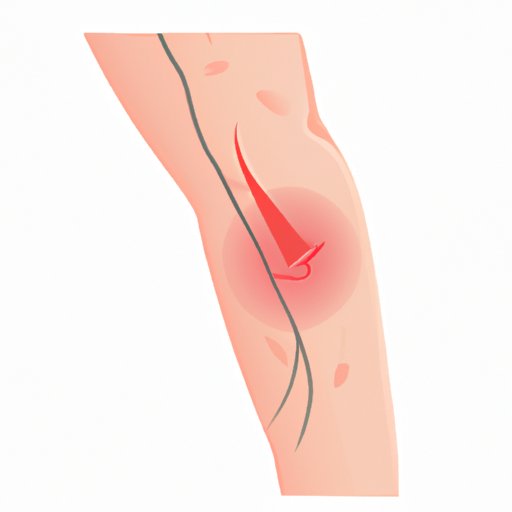
I. Introduction
A pinched nerve can present itself in different ways. It can cause tingling, numbness, and pain, and disrupt daily life. If you’re experiencing any of these symptoms, you’re not alone. In this article, we will go through the common causes of pinched nerves, how to prevent and manage them, and different treatment options.
II. Understanding Pinched Nerve
A pinched nerve is a condition that occurs when too much pressure is put on a nerve by surrounding tissues such as bones, muscles, or tendons. When this happens, it can disrupt normal nerve function, causing pain, tingling, numbness, or weakness in the affected area.
The most common areas affected by pinched nerves include the neck, lower back, wrists, and elbows.
III. Common Risk Factors for Getting a Pinched Nerve
Pinched nerves can affect anyone, but some factors may increase the likelihood of experiencing them. These include:
- Age: As we age, our bodies are more prone to natural wear and tear, which can increase the likelihood of experiencing a pinched nerve.
- Gender: Women may be more likely to experience pinched nerves in the wrist due to the smaller size of the carpal tunnel in females.
- Medical conditions: Certain medical conditions such as diabetes, obesity, and arthritis can increase the risk of developing a pinched nerve.
- Repetitive movements: People who perform repetitive movements or hold prolonged positions (such as certain types of office work) may develop a pinched nerve.
IV. Preventing Pinched Nerve
To prevent pinched nerves, you can take the following steps:
- Maintain good posture while standing or sitting and avoid slouching.
- Maintain a healthy weight through a combination of a balanced diet and regular exercise.
- Incorporate stretching or yoga into your daily routine to keep your muscles flexible and reduce tension in the body.
- Reduce stress levels through mindful practices like meditation and deep breathing.
- Take breaks from activities or positions that cause discomfort or pain. Regular movement can help keep blood flow and reduce pressure on nerves.
V. Stretches and Exercises for Alleviating and Preventing Pinched Nerves
Here are some stretches and exercises that can alleviate pressure on nerves:
- Neck stretches: Gently move the head from side to side, forward and backward to release neck tension.
- Wrist stretches: Slowly bend your wrist up, down, and from side to side to decrease tenseness in the wrist.
- Shoulder exercises: Shoulder rolls, and arm circles can be effective in relaxing shoulder muscles that may be causing nerve pressure.
- Lower back stretches: Lumbar rotations and pelvic tilts can stretch and release the lower back muscles.
It’s important to note that you should always listen to your body during any stretches and exercises. Stop immediately if you feel any sharp pain or unusual discomfort or if any of the symptoms worsen.
VI. Managing Pinched Nerves
For individuals who are experiencing symptoms of a pinched nerve, managing symptoms is the top priority. Here are some ways to ease discomfort:
- Heat or cold therapy can be effective in relaxing muscles and easing pain.
- Massage: Gentle massage can help promote blood flow and reduce tension in the affected area.
- Over-the-counter medications: Painkillers such as ibuprofen and acetaminophen can help reduce inflammation and alleviate pain.
- Rest and movement: Rest can aid in recovery. However, light movement and exercise can keep blood flowing and reduce nerve tension. Consult with a healthcare professional on recommended activities.
VII. Diagnosing Pinched Nerves
Diagnosing a pinched nerve typically involves a doctor taking a detailed medical history, conducting a physical examination and possibly ordering further diagnostic tests such as an X-ray or MRI. These tests can help identify the location of the pinched nerve and the extent of the damage.
If your symptoms are severe or interfere with your daily life, seek medical attention as soon as possible.
VIII. Treatment Options for Pinched Nerves
It’s crucial to manage the underlying cause of the pinched nerve to alleviate symptoms. Here are some treatment options:
- Physical therapy: A physical therapist can prescribe exercises and stretches to alleviate nerve pressure and help restore normal function.
- Medication: Over-the-counter pain relief medication, prescription medication, or nerve-blocking medication may be prescribed to manage symptoms.
- Chiropractic care: A chiropractor can perform spinal manipulation to help alleviate pressure on the spine and affected nerves.
- Surgery: In severe cases, surgery may be required to decompress the affected nerve.
Consult with your healthcare provider to explore the best treatment option suitable for your needs and symptoms.
IX. Conclusion
A pinched nerve is a condition that can affect anyone, but with proper care and treatment, it’s possible to manage and alleviate symptoms. Simple lifestyle changes such as maintaining good posture, incorporating stretch and exercise, and stress management can help prevent pinched nerves. Don’t hesitate to seek medical attention if your symptoms are severe and interfere with your daily life. Let’s do everything we can to protect our nerves and prolong our quality of life.




